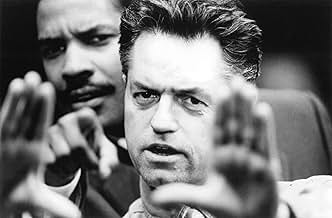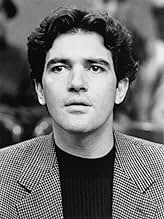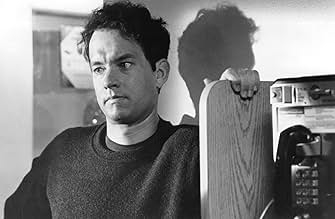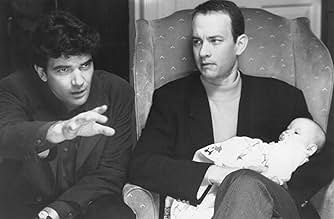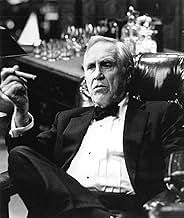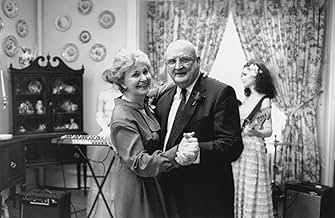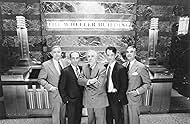Philadelphia
- 1993
- Tous publics
- 2h 5min
Lorsqu'un homme séropositif est licencié par son cabinet d'avocats en raison de son état, il décide d'engager un petit avocat homophobe, seul défenseur volontaire de son action en justice po... Tout lireLorsqu'un homme séropositif est licencié par son cabinet d'avocats en raison de son état, il décide d'engager un petit avocat homophobe, seul défenseur volontaire de son action en justice pour licenciement abusif.Lorsqu'un homme séropositif est licencié par son cabinet d'avocats en raison de son état, il décide d'engager un petit avocat homophobe, seul défenseur volontaire de son action en justice pour licenciement abusif.
- Réalisation
- Scénario
- Casting principal
- Récompensé par 2 Oscars
- 20 victoires et 23 nominations au total
- Rachel Smilow
- (as Stephanie Roth)
Avis à la une
This film was made almost a quarter of a century ago, and I guess to make Beckett sympathetic in those times there had to be nothing negative in his background. Thus the great family, his great intellect and passion for the law, and the solid long term partner in Miguel. His only failing - unprotected sex once in a gay porn theatre while in a relationship with Miguel. Thus the AIDS.
There really is no leading lady in this film. Instead, there are two leading men. Andrew Beckett as the plaintiff who cannot find a lawyer to take his case, and Denzel Washington as the attorney who ultimately takes his case, although he is initially scared of Andy, scared of AIDS, repulsed by the idea of gay people. Washington as attorney Joe Miller is portrayed as a devoted family man and flamboyant personal injury lawyer who thinks no plaintiff is too stupid to defend - numerous warning signs, plaintiff ignores them, plaintiff falls into manhole, for example. Yet he will not take Andy's case, initially. It's only after he sees a connection as to how he is treated at the public library for being African American and how Andy is treated there for being obviously ill of AIDS does he change his mind.
Where the great acting lies is in the growing friendship between Andy and Joe as they work on the case together. It is a subtle gradual shift in Joe's outlook until at the end, he buys a bottle of Dom Perignon to give to Andy in the hospital when, due to the price, he would not buy a bottle of that same champagne to celebrate the birth of his own child at the beginning of the film.
Honorable mention to Jason Robards as the chief partner of the law firm being sued who is more upset about the indignity of being hauled before the Philadelphia legal establishment as a civil defendant than he is about any possible loss of money, and to Joanne Woodward as Andy's mom who keeps a stiff upper lip in front of her son, yet the fact that he is dying in front of her is tearing her up. Sorry Mary Steenburgen, you are a great actress, but you just don't have me believing that you "hate gays", but you do have me believing you are a great attorney.
Today, lots of the characterizations may leave you feeling like you were hit over the head with a sledge hammer by Captain Obvious, but remember the time frame. People still had preconceived notions about homosexuals as in they must be deviant or have had something in their past that made them "that way", and they were definitely scared of AIDS and still not sure it was that hard to contract. Stick around for the great acting by Washington and Hanks and a host of supporting players. And also stick around for the final scene. It will jerk at your heartstrings.
AIDS is a reality and homophobia is a nasty truth that permeates our "United" States of America, as well as the rest of the world. At the time that this film was released (about 1993), the U.S. found solace in the idea that AIDS and homosexuality were dirty brothers in a distant family. By placing the film in the "City of Brotherly Love", hiring Bruce Springsteen to sing the title song and having an up-and-coming Tom Hanks star, director Jonathan Demme wisely readied an ignorant America for our first, uninhibited glance into the face of AIDS.
Tom Hanks embodied his role in an Oscar-worthy performance, allowing us to watch as his lovely and lively Andrew Beckett deteriorate before our eyes. Tom Hanks and the writers took to task the difficult and annoyingly controversial hurdle of playing the "gay" character and placing the "straight" audience into that different world. Stereotypes are mostly shied away from in the script with a few "fem" gays and drag queens. These scenes are few, but are also a reality. Many a Christmas party have I attended with the same crowd ("fems" and drag queens) in the mix. The other, mildly annoying, factor in this film is that the writers inform us that squeaky-clean gay Andrew Beckett contracts AIDS at a porn theater from an anonymous stranger, while in a committed relationship. This annoyed me because I wanted a righteous victim, not a impure victim. Yet as time has gone by and I have had the opportunity to work with many a victim of AIDS, whether be it male or female, gay or straight, I have seen that this too is an unfortunate reality. No one is perfect (gay or straight, male or female) and mistakes are often made. Costly mistakes are often made. This was a painful truth, but it is a truth nonetheless. In this, Tom Hanks as Mr. Beckett, brilliantly gave AIDS an honest face for a distant America.
Denzel Washington, on the other hand, allowed America to have a relatable character, one whose shoes we've fit in before. Denzel's views of homosexuality were (and still are) commonplace in the American psyche and his reactions to AIDS were understandable to the average audience. Yet all in all this dramatic film brought a message home.
Demme's directing style is nothing amazing; he tastefully weaves a tale without flashy shots or fancy cuts. At times the film borders on preachy, but, as always, it is Demme's story that grasps the audience, his mood that sets us into the tale, his actors and his direction of them that gives the film honesty. This film is highly recommended if not for the great acting but for lovers of a great story.
Le saviez-vous
- AnecdotesThe moment when Mary Steenburgen's character says that she hates the case was improvised in the moment, when the actress expressed her hate towards her role after shooting the mirror scene and Jonathan Demme encouraged her to incorporate it into the role, so the woman would seem more human.
- GaffesThe court stenographer doesn't seem to be actually typing, and the paper tape recording her keystrokes doesn't ever advance.
- Citations
Joe Miller: Have you ever felt discriminated against at Wyatt Wheeler?
Anthea Burton: Well, yes.
Joe Miller: In what way?
Anthea Burton: Well, Mr. Wheeler's secretary, Lydia, said that Mr. Wheeler had a problem with my earrings.
Joe Miller: Really?
Anthea Burton: Apparently Mr. Wheeler felt that they were too..."Ethnic" is the word she used. And she told me that he said that he would like it if I wore something a little less garish, a little smaller, and more "American."
Joe Miller: What'd you say?
Anthea Burton: I said my earrings are American. They're African-American.
- Crédits fous"This motion picture was inspired in part by Geoffrey Bowers' AIDS discrimination lawsuit, the courage and love of the Angius family and the struggles of the many others who, along with their loved ones, have experienced discrimination because of AIDS."
- Versions alternativesThe cable and network television versions of Philadelphia edit out portions of the pharmacy scene where a gay University of Pennsylvania law student attempts to pick up Joe Miller. These two versions end this scene with the law student responding "Do I?" to Joe Miller's question concerning whether Miller looked gay. In the theatrical, home video and premium channel versions, Joe Miller continues to berate the law student with bigot remarks regarding homosexuals.
- ConnexionsEdited into Die Geschichte des erotischen Films (2004)
- Bandes originalesStreets Of Philadelphia
Produced by Bruce Springsteen and Chuck Plotkin
Written and Performed by Bruce Springsteen
Courtesy of Columbia Records
Meilleurs choix
Détails
Box-office
- Budget
- 26 000 000 $US (estimé)
- Montant brut aux États-Unis et au Canada
- 77 446 440 $US
- Week-end de sortie aux États-Unis et au Canada
- 143 433 $US
- 26 déc. 1993
- Montant brut mondial
- 206 678 440 $US
- Durée2 heures 5 minutes
- Couleur
- Mixage
- Rapport de forme
- 1.85 : 1






